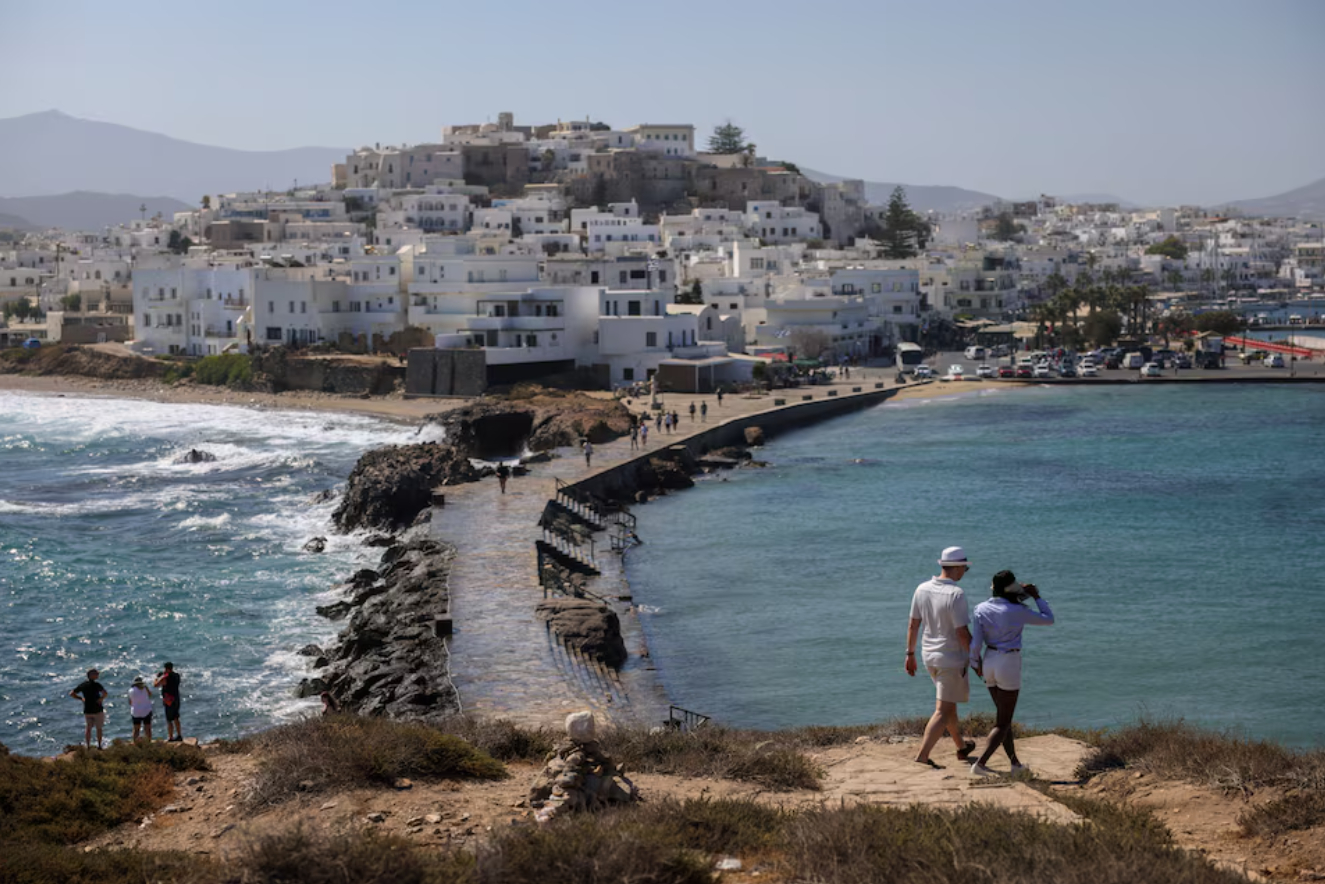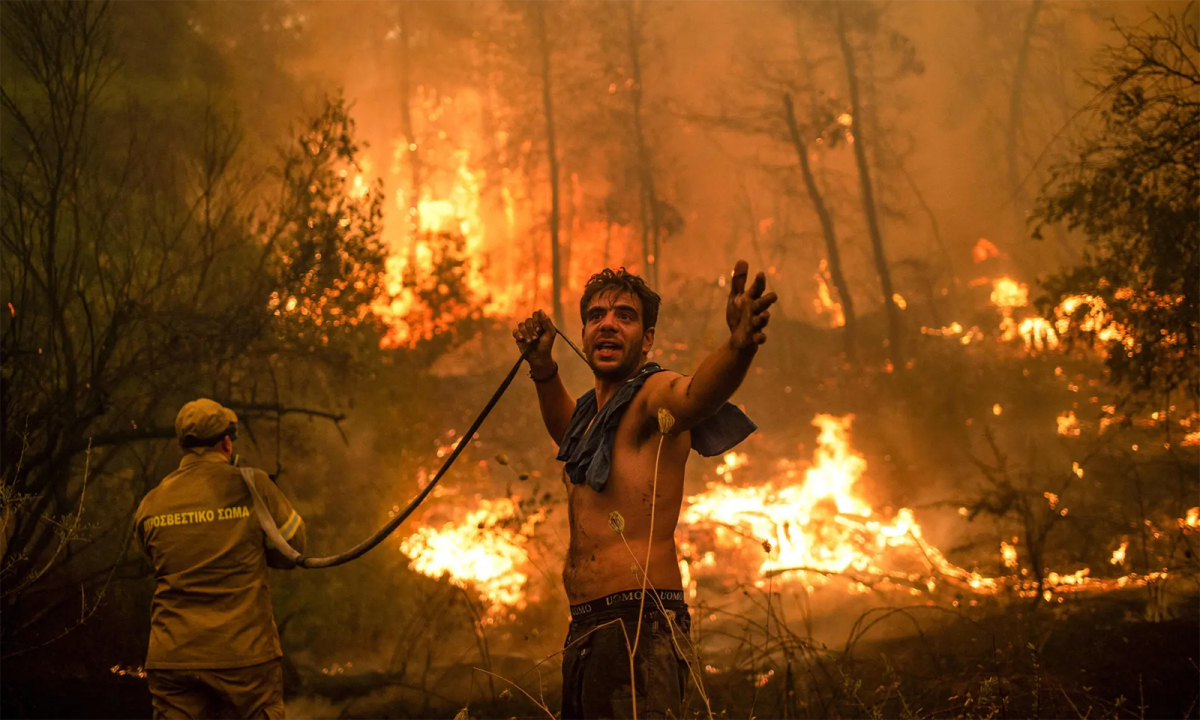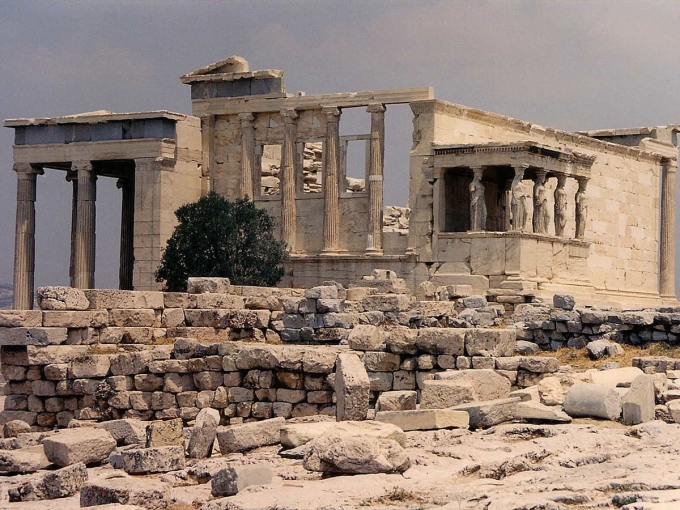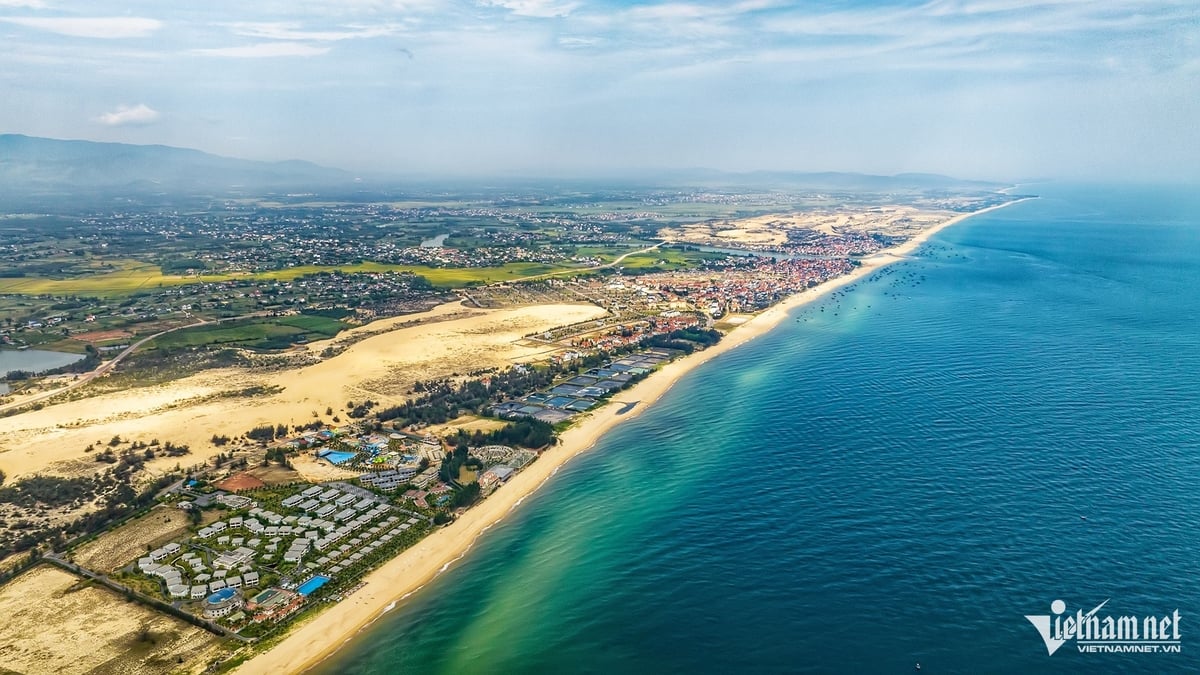From a top tourist destination
On World Tourism Day 27 September 2023, the European Union (EU) statistics agency Eurostat announced the world's top tourist destinations, with Greece among the highest-ranking countries.
However, this is not the first time that this southeastern European country has ranked high on the top travel destinations rankings. For millions of visitors from all over the world, Greece is truly a paradise, attracting both its natural beauty and its historical and cultural depth. Places like Santorini, Mykonos, and Zakynthos attract visitors with their stunning beaches and traditional coastal villages.

Tourists visit Chora on the island of Naxos, Greece, June 20, 2024. Photo: Reuters
As the intersection of three continents: Asia, Europe, Africa, Greece is a rare country that crystallizes the most brilliant culture of ancient times, from literature, architecture, sculpture to sports, in which ancient literature occupies a special position with epics such as the Iliad and the Odyssey.
Greek architecture is also full of magic for tourists with its magnificence, perfection, many temples, public works still exist today: Parthenon Temple, Acropolis, Temple of Zeus, Hephaestus, Ancient Athens Square, Theater and Temple of Apollo, Odeon Theater of Herodes Atticus,.. Greece is also home to many unique festivals that are hard to find in any other country: Jazz festival in Paxos, flour throwing festival in Galaxidi, outdoor music festivals, food festivals,... This country is also the birthplace of the Olympic Games.
Because of these countless attractions, Greece is always the most attractive land for global tourists. In 2022, Greek Tourism Minister Vassilis Kikilias revealed that the country's tourism revenue increased by 342% compared to 2021. In 2023, the number of visitors to Greece continued to reach a "huge" number when the country welcomed nearly 33 million visitors. This number has broken the record of 31.3 million visitors in 2019, when the Covid-19 pandemic had not yet broken out. The revenue of the Greek tourism industry has also increased to a record high, earning nearly 20.5 billion Euros, higher than the 18.15 billion Euros in 2019.
To the point of being haunted by climate change
However, the unpredictable consequences that Greece is facing from the problem of climate change are pushing the country's tourism industry into a new obsession. Like this summer, it is a "fiery" summer in both the literal and figurative sense for Greece. For many months, this southeastern European country has been struggling with dozens of consecutive forest fires.
On July 8, the Greek government announced that the country had to deal with more than 1,200 forest fires in June, double the number of firefighters in the same period last year. Greece has doubled the number of firefighters in specialized units to about 1,300. Residents and tourists have been forced to evacuate or stay away from forest fire areas or are at high risk of being visited by the fire.

Greece regularly faces forest fire disasters.
Drought and water shortages are another concern for residents and tourists in Greece. Much of Greece has seen little or no rain for months. In late June 2024, the largest reservoir on the Greek island of Naxos ran dry.
“There has been a severe lack of rainfall across the Mediterranean and especially on Naxos, our reservoirs have dried up,” said Dimitris Lianos, mayor of the island of Naxos. Authorities on Naxos have deployed mobile desalination units to address the immediate drinking water needs of residents and tourists. On the northern island of Thasos, authorities are also looking for a desalination unit to make seawater drinkable.
In addition to causing heat waves, wildfires, and water shortages, climate change is also having a negative impact on ancient Greek monuments and cultural heritage. For example, experts say that extreme weather events in recent years, as well as air pollution and acid rain, have caused structural problems in the walls and temples of the Acropolis - one of the best preserved archaeological sites in Greece.

Ancient Greece is said to have collapsed due to drought.
The dilemma of fighting a new enemy in peacetime
In 2023, facing the increasingly dire consequences of climate change, Greek Prime Minister Kyriakos Mitsotakis exclaimed that his country was experiencing “a kind of war in peacetime” and that climate change was the new enemy.
But it is not an easy battle, not only for Greece but for most countries. “We have bypassed COP29,” with many issues still unresolved, the most prominent of which is climate finance, or how rich countries finance developing countries to implement measures to adapt to climate change and switch to clean energy, “- emphasized Simon Stiell, Executive Secretary of the United Nations Framework Convention on Climate Change (UNFCCC).
Among them, “where is the money” is always the most pressing question. In 2009, developed countries agreed to contribute 100 billion USD/year to help low-income countries invest in clean energy and cope with the increasingly serious impacts of climate change, however, achieving this goal is now 2 years behind the commitment.
But difficulty does not mean accepting to stop, but accepting to confront. “The cost of recovering from natural disasters is huge, but our economy is strong enough to support it. What we have lost, the State and the people will rebuild together” - Greek Prime Minister Kyriakos Mitsotakis once declared.
Beyond the tangible benefits, especially from a tourism perspective, Greece is making a concerted effort to combat climate change. In April, Prime Minister Kyriakos Mitsotakis announced that the country is promoting 21 initiatives worth €780 million to protect marine biodiversity and tackle coastal pollution. Greece has also recently enacted a law to expand marine protected areas to more than 30% of its territorial waters by 2030. As part of these initiatives, Greece plans to establish two marine parks in the Ionian Sea and the Aegean Sea.
Marine conservation is also considered one of the four pillars of Greece's climate change strategy (the first pillar is to accelerate the green transition so that Greece gradually meets its electricity needs from natural sources - 60% this year and 80% by 2030; the second pillar is to strengthen the country and the state against natural disasters; the third pillar is public order and the built environment).
“Quietly but methodically, Greece is playing a leading role in defending against the severe climate changes that are affecting all regions and all activities,” the head of the Greek government said at the Our Ocean conference, which Athens will host from April 15 to 17, 2024, with the participation of some 120 countries.
Ha Anh
Source: https://www.congluan.vn/thien-duong-du-lich-hy-lap-va-noi-am-anh-mang-ten-bien-doi-khi-hau-post303023.html



![[Photo] Prime Minister Pham Minh Chinh chairs Government Standing Committee meeting on Gia Binh airport project](https://vphoto.vietnam.vn/thumb/1200x675/vietnam/resource/IMAGE/2025/5/10/6d3bef55258d417b9bca53fbefd4aeee)

































































































Comment (0)